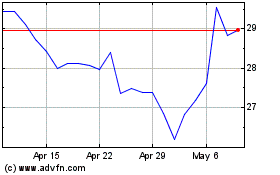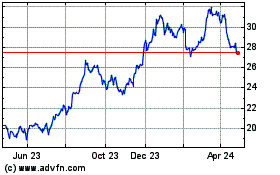J.P. Morgan Settles Asia Jobs Probe -- WSJ
November 18 2016 - 3:02AM
Dow Jones News
The $264 million fine ends inquiry of bank's hiring of connected
Chinese 'princelings'
By Aruna Viswanatha
A decade ago, a J.P. Morgan Chase & Co. managing director in
Asia sent an email to the investment-banking team: "As you know,
the firm does not condone the hiring of the children or other
relatives of clients or potential clients...In fact, the firm's
policies expressly forbid this," the director wrote.
Within two years, however, the team had begun orchestrating the
hiring of dozens of relatives of powerful government officials in
Asia with the express purpose of winning business, U.S. authorities
said Thursday. The bank had created a separate channel to get
unqualified applicants through the hiring process, and it later
began tracking profits from any subsequent business awarded because
of the hires, they said.
One candidate was described in an email as "the worst [business
analyst] candidate they had ever see[n]." Another had a "napping
habit" that would be an "eye-opening experience" for New York
colleagues. In both instances, the candidates were hired, according
to criminal and civil settlements the bank reached with the Justice
Department, the Securities and Exchange Commission and the Federal
Reserve.
All told, the bank hired around 100 applicants referred by
government officials at Chinese state-owned firms, and earned at
least $35 million as the result of a "corrupt scheme," according to
the settlement documents. The agreement ends a multiyear,
high-profile investigation that had called into question whether
the U.S. government was threatening to criminalize standard
business practices in some countries.
J.P. Morgan agreed to pay $264 million and admitted it violated
the Foreign Corrupt Practices Act -- which bars U.S. firms from
paying bribes to officials of foreign government in an effort to
win business -- through its hiring of so-called princelings. The
Wall Street Journal had reported the outlines of the settlement in
July. The 75 pages of settlement documents released on Thursday lay
bare how the bank had set up a formal structure -- dubbed the Sons
and Daughters program -- to leverage internships and win hundreds
of millions of dollars in deals.
Between December 2010 and March 2011, one Asia-based employee
maintained a spreadsheet that linked hires to specific clients, and
tracked revenue attributable to those hires, the documents
show.
"Some have argued that employment of a child, friend or relative
could not possibly induce a foreign official to take action.
Today's action demonstrates the falsity of that assertion," SEC
enforcement director Andrew Ceresney told reporters.
"The so-called Sons and Daughters Program was nothing more than
bribery by another name," said Leslie Caldwell, the head of the
Justice Department's criminal division.
J.P. Morgan spokesman Brian Marchiony said in a statement the
bank is "pleased that our cooperation was acknowledged in resolving
these investigations" and that the conduct was "unacceptable." Mr.
Marchiony said the bank stopped the hiring program in 2013 and
"took action against the individuals involved." He added that the
bank is still committed to the Asia-Pacific region. The agreement
said more than two dozen employees had been let go or disciplined
in connection with the investigation.
Several other banks are also under investigation for similar
hiring practices, including Citigroup Inc., Credit Suisse Group AG,
Deutsche Bank AG, Goldman Sachs Group Inc., HSBC Holdings PLC,
Morgan Stanley and UBS Group AG, according to regulatory filings.
The banks declined to comment. Mr. Ceresney said he expected
additional cases to follow the J.P. Morgan settlement.
The settlement documents cite emails in which J.P. Morgan
officials discuss similar tactics they believed other banks were
using.
In 2011, one employee asked for a hire to be switched into a
permanent job, despite the person's "undeniable underperformance"
because the "deal is large enough [and] we are pregnant enough with
this person, that we'd be crazy not to accommodate her father's
wants," according to an email cited in the agreement.
Also in 2011, one employee asked whether one hire did
substantive work. "We get real [investment banking] productivity
from [the referral hire] or is she a photocopier[?]" "Photocopier,"
was the response.
The agreements also show executives questioning why the bank
wasn't doing a better job of leveraging hires.
"We have more [lines of business] in China therefore in theory
we can accommodate more 'powerful' sons and daughters that could
benefit the entire platform," one of the bank's managing directors
in Asia said in 2009.
In a 2008 exchange, one executive responded when asked about a
prospective hire related to a potential client preparing for an
IPO: "A couple of points...to discuss and agree prior to any offer
being made to her: how do you get the best quid pro quo from the
relationship upon confirmation of the offer?"
--Emily Glazer contributed to this article.
Write to Aruna Viswanatha at Aruna.Viswanatha@wsj.com
(END) Dow Jones Newswires
November 18, 2016 02:47 ET (07:47 GMT)
Copyright (c) 2016 Dow Jones & Company, Inc.
UBS (NYSE:UBS)
Historical Stock Chart
From Mar 2024 to Apr 2024

UBS (NYSE:UBS)
Historical Stock Chart
From Apr 2023 to Apr 2024
